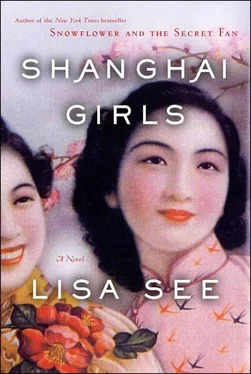“When you don’t want to help the family, you sound like you live in America,” he says.
“I do live in America,” I answer. “I care for my brother-in-law very much. You know that. But he’s not my husband. He’s May’s husband.”
“But you have a heart inside you, Pearl-ah.” His voice chokes with emotion. “You’re the only one I can trust to take care of my boy.”
I tell myself that fate is inevitable and that the only provable fate is death, but I wonder why fate always has to be tragic. We Chinese believe that there are many ways to improve our fates: sewing amulets onto our children’s clothes, asking for help from feng shui masters to pick propitious dates, and relying on astrology to tell us whether we should marry a Rat, a Rooster, or a Horse. But where is my fortune-the good that’s supposed to come to us in the form of happiness? I’m in a new home, but instead of a baby son to dote on, I have to take care of Vern. I’m just so tired and worn down. And I’m afraid all the time. I need help. I need someone to hear me.
The following Sunday, I go to church with Joy as I usually do. Listening to the reverend, I remember the first time God came into my life. I was a little girl, and a lo fan man dressed in black came up to me on the street outside our house in Shanghai. He wanted to sell me a Bible for two coppers. I went home and asked Mama for the money. She pushed me away, saying, “Tell that one-Goder to worship his ancestors instead. He’ll be better off in the afterworld.”
I went back outside, apologized to the missionary for keeping him waiting, and gave him Mama’s message. At that, he gave me the Bible for free. It was my first book, and I was excited to have it, but that night, after I went to sleep, Mama threw it away. The missionary didn’t give up on me though. He invited me to the Methodist mission. “Just come and play,” he said. Later he asked me to attend the mission’s school, also for free. Mama and Baba couldn’t turn down a bargain like that. When May was old enough, she began coming with me. But none of that Jesus-thinking sank into us. We were rice Christians, taking advantage of the foreign devils’ food and classes while ignoring their words and beliefs. When we became beautiful girls, whatever tendrils of Christianity had wormed their way into us shriveled and died. After what happened to China, Shanghai, and my home during the war, after what happened to Mama and me in the shack, I knew there couldn’t be a one-God who was benevolent and kind.
And now we have all of our recent trials and losses, the worst of which was the death of my son. All the Chinese herbs I took, all the offerings I made, all the questioning about the meaning of my dreams, did not, could not, save him, because I was looking for help in the wrong direction. As I sit on the hard bench in the church, I smile to myself as I remember the missionary I met on the street all those years ago. He always said that true conversion was inevitable. Now it has come at last. I begin to pray-not for Father Louie, whose lifetime of hard work is coming to an end; not for my husband, who bears the family’s burdens on his iron fan; not for my baby in the afterworld; not for Vern, whose bones are collapsing before my eyes; but to bring peace of mind, to make sense of all the bad things in my life, and to believe that maybe all this suffering will be rewarded in Heaven.
I WATER THE eggplants and the tomatoes, then pull the hose to the cucumber vine that engulfs the trellis by the incinerator. When I’m done, I roll up the hose, duck under the clothesline, and head back toward the porch. It’s still early on this Sunday morning in the summer of 1952, and it’s going to be a scorcher. I love that American word -scorcher- because it makes so much sense in this desert of a city. Shanghai always felt like we were being steamed to death in the humidity.
When we first moved into this house, I told Sam, “I want us to have food to eat, and I also want to bring a little China here.” So Sam and a couple of the uncles dug up the lawn and I planted a vegetable garden. I brought back to life the chrysanthemums, which bloomed beautifully last fall, and have nursed some geranium cuttings into thriving plants against the screened porch. During the past two years, I’ve added pots with cymbidiums, a kumquat tree, and azaleas. I tried peonies-the most beloved of Chinese flowers-but it never gets cold enough here for them to grow properly. My rhododendrons failed too. Sam asked for a patch of bamboo; now we’re forever hacking it back and seeing new shoots come up in places where we don’t want it.
I climb the steps and enter the screened porch, where I toss my apron on the washing machine, straighten May’s and Joy’s beds, and then go to the kitchen. Sam and I are co-owners of the property with the rest of the family, but I’m the eldest woman in the household. The kitchen is my territory, and this room literally holds my wealth. Under the sink are now two coffee cans: one for bacon grease, the other for Sam’s and my savings for Joy to go to college. An oilcloth covers the table, and a thermos filled with hot water sits ready to make tea. A wok is set permanently on the stove; in a pot on one of the back burners some herbs boil for a tonic for Vern. I prepare a breakfast tray and take it through the living room and down the hall.
Vern’s room belongs to a man forever a small child. Other than the closet with May’s clothes-the one reminder that Vern is married-the many models that he’s glued together and painted decorate the room. Fighter jets hang from fishing line from the ceiling. Ships, submarines, and race cars line floor-to-ceiling shelves.
He’s awake, listening to a radio commentary about the war in North Korea and the threat of Communism, and working on one of his models. I set down his tray, pull up the bamboo shades, and open the window so the glue won’t go to his head too much.
“Can I get you anything else?”
He smiles at me sweetly. After three years of the soft-bone disease, he looks like a little boy, staying home sick from school for a day. “Paints and brushes?”
I put them within arm’s reach. “Your father will stay with you today. If you need anything, just call and he’ll come.”
I refuse to worry that something bad will happen if we leave the two of them home alone, because I know exactly what their day will be: Vern will work on his model, eat a simple lunch, mess his pants, and work on his model some more. Father Louie will do light chores around the house, make that simple lunch, avoid his son’s messy bottom by walking to the corner to buy his newspapers, and nap until we come home.
I give Vern a wave, and then I go to the living room, where Sam tends the family altar. He bows before Yen-yen’s photograph. Since we don’t have photographs of everyone who’s left us, he’s put one of Mama’s pouches on the altar and a miniature rickshaw to represent Baba. In a tiny box, there’s a clip of my son’s hair. Sam honors his entire family with ceramic fruit made in the country style.
I’ve grown to love this room. I’ve framed and hung family photos on the wall above the couch. Each winter since we’ve lived here, we’ve set up a flocked Christmas tree in the corner and decorated it with red balls. We outline our front windows with Christmas lights so that this room glows with the news of Jesus’ birth. On cold nights, May, Joy, and I take turns standing over the heater grate until our flannel nightgowns balloon out like we’re snow creatures.
I watch as Joy helps her grandfather to his recliner and serves him tea. I’m proud that Joy is a proper Chinese girl. She defers to her grandfather, the eldest in our family above everyone else, including her father and me. She understands that everything she does is not only her grandfather’s business but also his right to decide. He wants her to learn embroidery, sewing, cleaning, and cooking. In the curio shop after school, she does many of the jobs I once did-polishing, sweeping, and dusting. “Her training as a future wife and mother of my great-grandsons is important,” Father Louie says, and we all try to honor that. And even though all hope of returning to China is lost, he still says, “We don’t want Pan-di to become too Americanized. We’ll all go back to China one day.” Sentiments like this tell us he’s slipping. It’s hard to believe that he once ruled us with such authority or that we were all so afraid of him. We used to call him Old Man, but now he’s a very old man, slowly weakening, slowly drifting away from us, slowly losing his memories, his strength, and his connection to the things that have always driven him: money, business, and family.
Читать дальше












